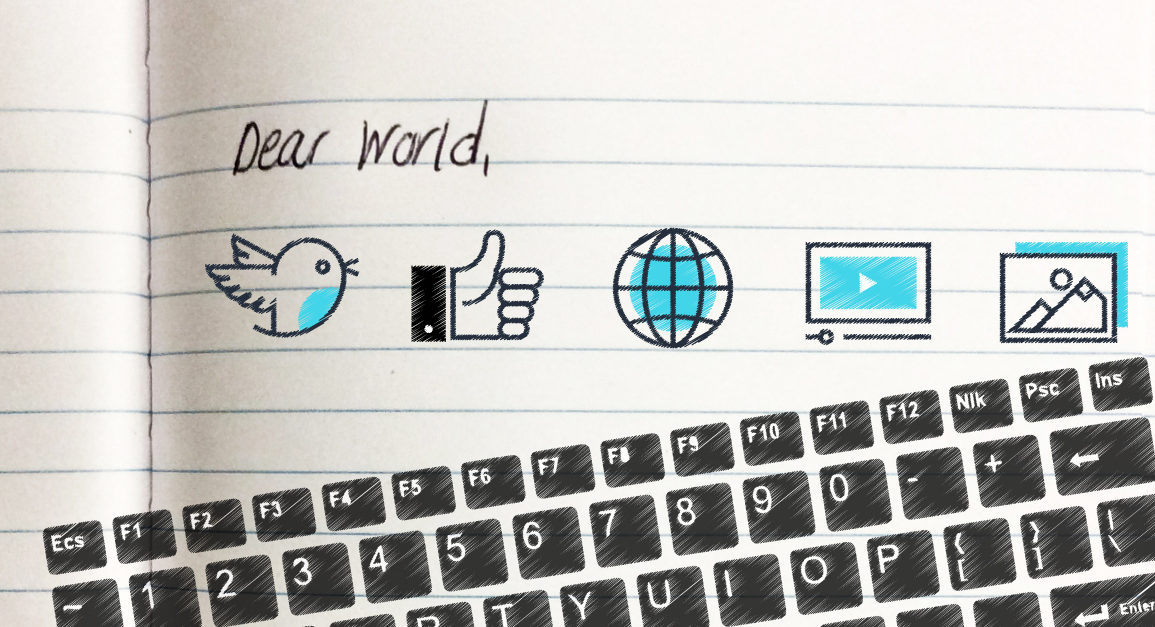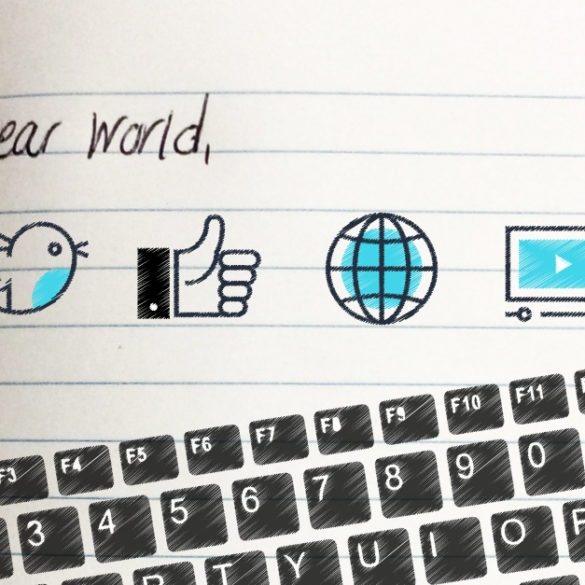Social networking has grown a great deal since the first email was sent in 1971. In today’s age of technology, Internet users use websites like Facebook and Twitter to connect with their friends and coworkers. Instagram shows one’s followers the places they go and interesting things they do. Even applications like Snapchat exist for sharing an exact moment in time or holding a quick conversation. New applications are being produced every day to make it even easier to access each other’s company, even if the sender is across the country.
It is not surprising that Millennials, the largest living generation in today’s date, take up the largest percentage of social media users. Millennials are known for their constant use of technology, and around 52 percent of young adults are multi-platform across different networks and applications every day, according to a study by the Pew Research Center. Three out of four young adults have a smart phone, which they use to regularly update statuses on Twitter and post photos online.
Sometimes sharing online can be seen as excessive to certain social media users, resulting in oversharing and publishing personal information on a public networking site. Generations of people network with each other online, but do not always agree that the information shared directly, or even indirectly like the recent Ashley Madison account leaks, is always justified.
Ball Bearings met with four individuals from different generations to discuss sharing on social media. Kaitlin Bank, a Millennial advertising undergraduate student; Danielle Mastin, an older Millennial and former student at Ivy Tech; Melinda Messineo, a Generation X professor of sociology; and Michael Gillilan, a Baby Boomer and director of student rights and community standards.
Ball Bearings: How often do you use social media?
Bank: Every day. I’m mostly on Twitter and Instagram. I check those five times a day, or at the least every morning. I get on Facebook once in awhile because I don’t like to get on Facebook. I’m on Tumblr when I’m bored; Pinterest and Snapchat to watch people’s stories.
Mastin: Generally I get on Facebook once or twice a day to keep up with friends and see what funny things people have posted.
Messineo: I don’t use it very much. I use it daily, but only for about 15 minutes or so. I am on LinkedIn and Facebook occasionally, but I use texting and email more frequently.
Gillilan: I’m on social media for maybe an hour a day. I have a personal Facebook account, and I have a couple of Twitter accounts – one for our office and a personal Twitter account I rarely use.
BB: What do you believe should be shared online and should not be shared online? What types of posts are okay and what aren’t okay?
Bank: Achievements like ‘oh, I got accepted to Harvard!’ are okay, or if you had a good day. That’s something I’d put online. Something that makes you happy should be put online, which could be considered oversharing depending on how personal they want to get.
Mastin: My sister likes to share her monthly feminine issues on Facebook and it is a bit too much. I think some health issues should be kept off Facebook because I think people see it as a way to seek pity, and I personally don’t agree with that. If it’s a serious issue and you have family far away and are just neutrally explaining what you’re going through. I think it’s just the way you put it. I just don’t treat Facebook like a diary.
Messineo: I think everything you put online you have to think about living forever, so you shouldn’t post something online you wouldn’t want to be confronted with ten years from now. Let’s say you had some snarky comment about your high school boss, which is fine at that age, but when you go to get a promotion that would not be okay. I think also it diminishes someone else’s social presence, because it’s hard to get rid of stuff and what you think is okay to post might not be okay for someone else. If you act out emotionally, you need to monitor yourself.
Gillilan: I mean, you certainly shouldn’t post things you don’t want to. I usually am posting things making fun of myself and take selfies to make people laugh, or posting pictures of my dogs. I avoid posting things about my personal beliefs, or spiritual and political beliefs, unless on rare occasion. I don’t share some things, what I’m eating or wearing, because I know most people don’t care.
BB: When do you personally believe that sharing information becomes oversharing?
Bank: A girl I know got in a car accident and she posted this big, lengthy post about it and no one really asked so it looked like she was seeking attention. Or when people won’t shut up about their kids. My sister shares posts about when her daughter goes to the bathroom; I unfollowed her. I don’t think people should post directly about their private life.
Mastin: When the post involves too much detail. There’s some people that could say ‘I’m having a rough day’ and say something vague but then there’s people that list every specific bad thing. I don’t really care what you’re doing.
Messineo: When someone is posting a picture showing inappropriate behavior or doing stuff someone regrets. The thing that I think is the most important is when you share something that affects other people’s lives. For example, someone complaining about their partner online because not only are you exhibiting behavior but you’re also oversharing someone else’s life and they aren’t there to moderate how they are being presented in that setting.
Gillilan: What I see as oversharing might be completely normal to a student, like a selfie in a public restroom. When I see that the younger generation post certain things I kind of raise my eyebrows, but it’s a new world. It’s their world and not mine, but their digital world that involves members of the older generation that don’t necessarily value or appreciate the way that they share information about themselves with their peers.
BB: Do you think employers look at social media accounts?
Bank: I think so, I kind of hope not. I don’t put anything bad up, but just in case they would find something offensive I hope they don’t. I haven’t gone through and done anything to my social media yet.
Mastin: Yes. For one, they have to make sure their company isn’t being bad-mouthed. There are some companies that want you to represent yourself in a professional level, like lawyers and law firms, and uploading pictures drinking at a bar in inappropriate clothing is not the best publicity.
Messineo: I do, and I have. I think it will keep happening. We look online to see people’s online presence all of the time. Would we work hard to find it? No, we don’t try too hard to find stuff. It’s so easy to find stuff.
Gillilan: I absolutely do. When it’s a buyer’s market and there are more jobs than people to fill them, you’re going to be less cautious about the people you hire. That is not the case now. Not only that, but you want to have people that can present your company well. You’re going to be looking for someone that’s not going to embarrass your company or put them on the front page, or even get your company sued. I’m looking for people with good judgement.
BB: Do you think social media determines one’s work ethic?
Bank: I don’t think it should. Unless it’s talking specifically about work, then I don’t think it should or can determine it. If I post something with a cuss word in it, people would find that offensive, but that doesn’t mean I’m not a good worker. It just means that I am not “old fashioned” and I’m new. Maybe if someone posted a status about how high they got or drinking all of the time would determine [work ethic] more.
Mastin: Not necessarily, because the person who I am at work is completely different than who I am online. I have a work self and I have a home self and a friend self. Your personal faces don’t really determine how well you work.
Messineo: I think they determine part of the picture when determining one’s work ethic. If you can see if someone is active on Twitter and has a professional appearance or a lack-there-of, you’re going to want to ask questions. If you’ve been very uncomplimentary to your past employer on Twitter, justified or not, that’s going to have an impact on how people see you. If they’re posting like that right now, odds are they’re going to continue in a different work environment as well.
Gillilan: I try to stay pretty liberal when it comes to what I find okay and not okay. When people work from 9-5 and come home, what they post is usually part of their after work time. Unfortunately, I find that sometimes people’s after work judgement carries on into the work day, which makes it a factor into whether they are suitable for a position.
BB: How do you think the personal information that has been put online will affect job searching in the future for the Millennial generation?
Bank: Overall, I think it will make it harder for people to get jobs, because people our age post their stuff online all of the time. It seems like so many people are going to see that. It will either help them, because they’ve done a lot of good things, or hurt them because they don’t take life seriously.
Mastin: If you’ve applied for a job and you’ve spent the last three years online posting half-naked pictures and saying gruesome things, your employer will Google that and you immediately lose your chance. People need to think about what they say before they say it. It’s lowering the amount of candidates people can look at for a job, so it’s making it harder for the employer as well. But I think it would potentially affect everyone. I’ve seen people in their 50’s and 60’s saying things I wouldn’t even say online, but I think it’s because they don’t quite understand how they’re supposed to be using social media.
Messineo: We’ve always looked at Millennials and said that they live online differently than any past generation. They’ve put stuff up that previous generations would have never put up in that time frame, but they’re also coming at it from a different comfort level. Because everyone is doing it, people are comfortable with it and it’s the culture that it seems less weird. To the degree that Millennials will be hiring Millennials, I think it will have less impact in the future and people’s expectations will be a little different. Where I think it’s most challenging right now is that there’s information non-Millennials think is inaccessible and I think that’s going to be interesting. It’s easier to get arrest records and information from other cities that make it difficult to recreate yourself.
Gillilan: Yes, the good news is more and more younger people are making the decision of who gets a job now, and less people from my generation are in the employer’s position. For now, though, employers are going through your pictures and posts online and saying ‘Does this picture of you drinking or half naked affect what they will bring into the job? What will I lose if I say no to this person?’ Employers are going to have to become more savvy with this concept in order to make accurate decisions.
BB: Do you believe that our personal information is too easy to access on social media?
Bank: Personal ads kind of freak me out because I’ll be looking at something on Amazon and then it’ll be on Facebook. That’s a little invasive, but information that you put up you can decide who sees that so I don’t think that’s a big deal. But using cookies and stuff freaks me out a lot. They know everything about you.
Mastin: Even with privacy settings I’m very paranoid. I mean, you can set everything to where you can’t see where you work or what town you live in but there’s still some kind of hint. If you tag yourself at Arby’s on Wheeling Avenue, everyone’s gonna know you were in Muncie around that area. It’s so easy.
Messineo: That’s the glory of social media now- it’s fast and it’s mass media. Its very nature is easy. Is it too easy? If you’re not vigilant, yeah. You have to become the monitor of what is accessible on there. People are realizing now that everything is public.
Gillilan: I don’t necessarily share what I like, where I am, or who I’m with because of safety and security. Facebook and all of these online accounts are not private no matter how much I tweak my privacy settings. My information is available to a lot of people, even people I might not necessarily know.
BB: With the recent hacks of accounts online like the Ashley Madison data, do you think this information should be accessible?
Bank: No, what you do on your own time is your own thing. I can’t say overall that everyone should be outed because a few people are doing bad things. People are allowed to have their privacy, and that’s why we had wars and made the Constitution and search and seizure in the Fourth Amendment, so that people can’t just go into your house and go through your stuff. It should be private.
Mastin: I don’t necessarily think it should be accessible because your personal life is your person life. Then again, you’re asking for it when you put it online. It shouldn’t be accessible to the public but it is and that’s your own risk-taking.
Messineo: People believed that they were participating in a system that was truly protecting their identity. If you have the reasonable expectation of privacy you should be able to interact in an environment that honors that reasonable expectation of privacy. So no, it should not be there. However, we are naive to think that there is an actual right to believe privacy. Those people probably should have had some suspicion that it was going to be public some day.
Gillilan: No, it really should, but it goes back to judgement. The more you put online the more you should be aware that the information could become public. The only way to keep yourself completely private is to opt out. When you enter into something like Ashley Madison or enter your credit card at Target or Home Depot, your information is in digital form and accessible to someone. Anyone could get into that at any time.
Ball Bearings has edited statements down for clarity.







